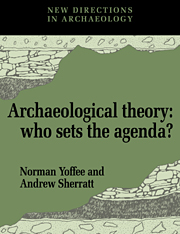Book contents
- Frontmatter
- Contents
- List of figures
- List of contributors
- Introduction: the sources of archaeological theory
- PART I THE SOCIAL CONTEXT OF ARCHAEOLOGICAL THEORY
- PART II ARCHAEOLOGICAL THEORY FROM THE PALAEOLITHIC TO THE STATE
- 4 Ancestors and agendas
- 5 After social evolution: a new archaeological agenda?
- 6 Too many chiefs? (or, Safe texts for the '90s)
- PART III CASE STUDIES IN ARCHAEOLOGICAL THEORY AND PRACTICE
- PART IV EPILOGUE
- Index
5 - After social evolution: a new archaeological agenda?
Published online by Cambridge University Press: 03 May 2010
- Frontmatter
- Contents
- List of figures
- List of contributors
- Introduction: the sources of archaeological theory
- PART I THE SOCIAL CONTEXT OF ARCHAEOLOGICAL THEORY
- PART II ARCHAEOLOGICAL THEORY FROM THE PALAEOLITHIC TO THE STATE
- 4 Ancestors and agendas
- 5 After social evolution: a new archaeological agenda?
- 6 Too many chiefs? (or, Safe texts for the '90s)
- PART III CASE STUDIES IN ARCHAEOLOGICAL THEORY AND PRACTICE
- PART IV EPILOGUE
- Index
Summary
Introduction
The social archaeology of non–state agrarian societies emerged in the 1960s and 1970s as a concern with the growth and differentiation of social institutions within a neoevolutionary framework. Such societies were characterized as tribes or chiefdoms; or as ranked societies, a category which largely obviated the need for distinguishing between the other two. Criticisms of this approach have been of various kinds. “Processual” attacks criticized typologies in general for a failure to recognize that there is a continuum of social complexity and for bundling together a variety of different social attributes, regarded as characterizing particular social types, instead of explaining the contingent social relations between them. Other attacks have been more radical, in both substance and political intent. It has been suggested that the discourse of social complexity in which recent discussions of social evolution have been framed is merely a re–expression of the ethnocentric emphasis on progress which characterized the nineteenth century, and which Rowlands (1989) suggests is typical of the Judaeo – Christian tradition. The view may be summed up in the statement by Giddens (1984: 236) that “Human history does not have an evolutionary ‘shape’ and positive harm can be done by attempting to compress it into one.” Giddens intends this statement in both an empirical and an evaluative sense.
- Type
- Chapter
- Information
- Archaeological TheoryWho Sets the Agenda?, pp. 53 - 59Publisher: Cambridge University PressPrint publication year: 1993
- 20
- Cited by



